Multidisciplinary research activities and collaboration that will begin during the summer school and workshop are envisaged to be continued after the workshop. To help foster this long-lasting, mutually beneficial outcome, we encourage participants to collaboratively prepare a peer-reviewed publication synthesizing the challenges and priorities in ecosystem research in the Atlantic Ocean.
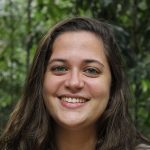
Adriana R.L. Pessôa
I am a biologist from Brazil and I’m currently a PhD candidate in Biophysics at the Federal University of Rio de Janeiro. Despite majoring in Zoology, I was always passionate by the sea and so since 2010 I work with contaminants in marine environment. I always had a strong interest in coastal and marine environments and my work was always focused on using marine animals as biomonitors of pollutants in the marine environment. In my doctorate, I am investigating the presence of unmonitored persistent pollutants and quantifying anthropogenic and natural organic compounds in bycatch fish samples from the Guanabara Bay, a highly polluted bay located in the city of Rio de Janeiro, Brazil. My main research interests are environmental chemistry, marine pollution and food web behavior of contaminants. Besides that, I love to participate in outreach and education activities. I am an active member of the national Brazilian committee of the Association of Polar Early Career Scientists (APECS-Brazil), which I have been part of the Executive Committee from 2016 to 2020. I also love travelling, tasting new food and beers, to paddle, watch movies and hang out with my friends, my family and my little dog Vicky.
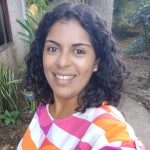
Aline Barbosa da Silva
I am an oceanographer. PhD and Master in Physical, Chemical and Geological Oceanography at the Federal University of Rio Grande – FURG. I work in geosciences, geoprocessing and geographic information system (GIS), specializing in geospatial analysis and remote sensing data. In the master and doctorate I worked on flow speed, glacier GIS and climate change in the Antarctic Peninsula and did an internship in Germany at the University of Erlangen in the geosciences area of FAU, where I improved my research on spatial analysis algorithms. In the first post doctorate I worked with remote tracking of seabirds with behavioral analysis based on space use algorithms. Currently I am working as a post doctoral researcher at the Oceanography Institute – FURG in research small pelagics, mesopelagic fauna and apex predators. My interest is in the abundance, diversity and vertical and horizontal distribution of small pelagic and mesopelagic fauna, including their relevance to fisheries through historical data and oceanographic cruises.
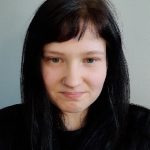
Amrei Gründer
I am currently studying for a master degree in marine biology. I acquired my bachelor degree in Biology at the University of Greifswald. Then I decided to pursue my passion for marine biology at the University of Bremen. I got involved with the Thünen-Institute for a student research project, when I had the opportunity to work on size spectra of mesopelagic fish communities off Mauritania and Senegal. I am glad to be able to follow up on that work in my master thesis by investigating how the size spectra are linked to functional composition. I am fascinated with deep pelagic ecosystems and I am interested of how anthropogenic impacts like eutrophication, litter, increased atmospheric carbon levels and the resulting increase in temperature can affect the biosphere.
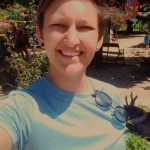
Bruna de Ramos
I am from Brazil, currently doing my Ph.D. in Oceanography at the Federal University of Pernambuco – UFPE. During my Master’s in Coastal Management, I worked with marine debris sampling and data analysis in southern Brazil. Currently my research is focused on interaction between meteo-oceanographic factors with marine debris, including hydrodynamic modeling to map the transport and deposition of floating marine debris, especially on the Brazilian northeast coast. Also, I am interested in coastal and marine management. The areas that fascinate me the most are marine pollution, management, and data science. I love to discover new things, especially technological approaches to analyzing environmental data and support desision-making. I am fieldwork enthusiastic, and I feel alive collecting data and being in the ocean. In my spare time, I like traveling, riding a bike, swimming and snorkeling, playing rugby, listening to music, and trying to play the ukulele to my cats.

Camila Artana
I am physical oceanographer currently working at Instituto Ciencias del Mar in Barcelona, in the department of Renewable Marine Resources. My career choices have been mainly motivated by my concerns regarding climate change. After completing my Master’s degree at the University of Buenos Aires in 2015 I moved to France to pursue a PhD at LOCEAN, Sorbonne University, where I revisited the dynamics of the Malvinas Current under global warming. After completing my PhD, I continued my research at LOCEAN as a postdoc, extending it to the entire Argentinean Basin: from the Drake Passage to the Brazil Current. Since April 2022 I am working at Insituto Ciencias del Mar under a Severo Ochoa grant. My current research focuses on Marine Heat Waves along the South American coast. I wish to contribute to the understanding of ocean dynamics and their role in climate and marine ecosystems.
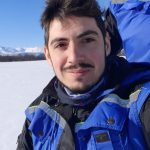
Edson Silva
Edson Silva is a Ph.D. student at the Nansen Environmental and Remote Sensing Center (NERSC). He has a BSc. degree in Oceanography and an MSc. degree in Remote Sensing. Edson has been actively researching oceanography and remote sensing, focusing on algae blooms, optical water types, and bio-optical algorithms. Currently, he is studying harmful algae blooms (HAB). His research aims to understand the mechanisms driving HABs in Norway and how to use this information to predict them on a sub-seasonal to seasonal scale. Edson is looking forward to expanding his study to other regions, such as in tropical waters.
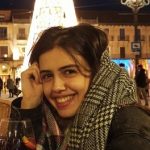
Elena Calvo Miguélez
I studied physics at Oviedo University, Spain. During my last year, I became interested in atmospheric and climate sciences. After that, I decided to study a master’s in meteorology at the Complutense University of Madrid, where I’m currently doing a PhD. Due to my great interest in sustainable resource management and mitigation of environmental impacts due to climate change, my current work is focused on finding sources of climate predictability for tropical Atlantic ecosystems. To achieve my goals, I apply statistical analysis techniques implemented in Python. Other than this, I use satellite observational data and atmospheric and oceanic reanalysis. I also have an interest in science outreach and in international cooperation. In fact, last year I went to Senegal as part of an exchange project in which we, as master students, participated helping local students in a data analysis course. I love spending time with my friends, reading and travelling.
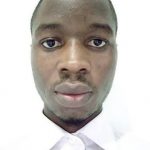
Fabius Cedric
I am a Ph.D. student at the Federal University of Pernambuco (UFPE) in Brazil. I completed my BSc. and MSc. degree in Oceanography and Limnology (Engineer degree in Fisheries and Aquatic Sciences) in Cameroon; and then, completed an MSc. degree (double degree) in Physical Oceanography and Applications in Benin/France (Co-tutorship). During my Masters, I worked on the Variability of Sea Breezes Over the Cameroonian Coast and Their Interaction With the West African Monsoon; then, I worked on Dynamics and vertical decoupling of NBC rings upon impact on the Caribbean Arc. After completing this, I moved to Brazil to pursue a PhD at CEERMA/UFPE, where I actively work on the Internal Tides Interaction with Mesoscale processes Off the Amazon shelf. My current investigation focuses on the dissipation inferred from Velocity Microstructure Profiler (VMP) and on the physical processes responsible for this off the Amazon mouth. I wish to contribute to the understanding of the internal tides interactions with mesoscale in the tropical Atlantic; and of the tide-driven mixing for the climate system and marine resources.

Fanny Arouna Khalil
Recently graduated with a Master’s degree in Energy, Climate and Environment at the LASMES from Felix Houphouet-Boigny University of Abidjan (UFHB), I am passionate about physics, physical oceanography and applications. After obtaining my baccalaureate, I evolved within the Physics-Chemistry common core and then in the specialty of Physics. During these undergraduate years, I developed a great interest for the study of the environment and the mitigation of climate change, which led me to opt for the Master in Energy, Climate and Environment at UFHB. During my master’s internship at LASMES, I worked with the Physical Oceanography research team of the laboratory. The knowledge acquired during the training courses in oceanography in which I participated and my Master’s works allowed me to better master the various phenomena related to the oceans, the indicators and important tools for the study of these phenomena and more precisely, the challenges and problems that need to be solved, particularly the climate change issue and the sustainable development.
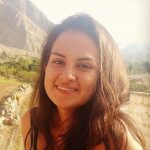
Fiorella Vilela
I am a Peruvian biologist graduated from the Peruvian University Cayetano Heredia (UPCH). At the beginning of my career I worked with issues related to the Peruvian anchoveta fishery at the Instituto del Mar del Peru (IMARPE). During this period, I focused on developing skills in the use of programming and statistical tools for data analysis, which allowed me to collaborate in research work on Peruvian marine fauna, mainly top predators. Currently, I am finishing my master studies in Ecology at the Federal University of Rio Grande do Sul (UFRGS). My master’s studies were focused on the study of the movement of tropical seabirds through the use of biologging tools and statistical modeling techniques. In the future, I would like to extend my knowledge of bird movement at finer scales, using accelerometric data, as well as to evaluate the possible effect of anthropic activities such as fishing and environmental variables on their behavior. In that sense, I am interested in learning about the functioning of physical and environmental variables within tropical ecosystems.
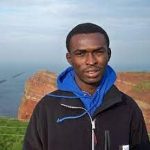
Folly Serge Tomety
From Togo, Serge Tomety is a postdoctoral fellow at the Nansen Tutu Centre, Department of Oceanography at the University of Cape Town. His research focuses on the southern African coastal climate change and variability with a focus on Marine Heat Waves and extreme events and their impact on the marine ecosystem. Before starting his postdoctoral, Serge did his PhD at the same institution. His PhD, in the same topics, focussed on decadal trends and decadal variability of the Benguela Upwelling System. His new move is to study the implication of Marine Heat waves and extreme events on the marine ecosystem of southern Africa. Attending this summer school is a good opportunity to learn the ecosystem functioning and its variability, which is relevant to his postdoctoral research. Serge enjoys playing soccer in his spare time.
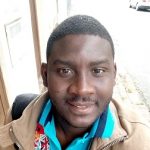
Founi Mesmin Awo
I am from Benin, currently doing my Postdoc in Physical Oceanography at Nansen Tutu Centre, Department of Oceanography, University of Cape town, South Africa. My research focuses on ocean variability in the southeastern tropical Atlantic region. This region is marked by the occurrence of extreme warm and cold events namely Benguela Niños/Niñas which impact the marine ecosystem by modulating the upward supply of nutrients. I am currently working on the Benguela Niños and Congo River discharge on ocean salinity and the marine ecosystem in this region, as a part of the International Horizon 20/20 TRIATLAS project. During my PhD in France and Benin, I worked on the dynamics and impacts of the tropical Atlantic climate modes. In my spare time, I enjoy travelling, sports activities, but also good books and music.
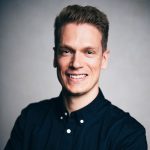
Franz Philip Tuchen
I am currently a Postdoctoral Research Associate at NOAA’s Atlantic Oceanographic and Meteorological Laboratory in Miami, USA. My research focuses on tropical and equatorial ocean dynamics on a wide range of temporal and spatial scales and its role in weather, climate variability, and ecosystems. During my time as a doctoral researcher at GEOMAR Helmholtz Centre for Ocean Research Kiel, I especially focused on subtropical/tropical circulation variability and oxygen ventilation, equatorial wave dynamics, intraseasonal variability, and equatorial deep jets in the Atlantic. I am especially interested in linking physical oceanography with biogeochemical variability and to put multi-disciplinary approaches into practice by broadening my own scientific horizons during the summer school and workshop. In my spare time, I enjoy playing and watching football (known as soccer in the US), travelling and enjoying the outdoors, going to concerts or tasting new beers.
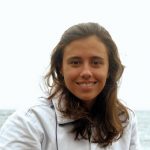
Joana Brito
I am a PhD student at the University of the Azores, under the supervision of Dr. Telmo Morato. My motivation to contribute to the conservation of marine ecosystems led me to the Azores in 2016, where I joined the Azores Deep Sea Ecology Research Group to develop the research for my master thesis. Since then, I have been involved in the team’s efforts to uncover some of the deep-sea paradigms in order to find the most appropriate management tools to protect it from the many threats it faces. I am interested at advancing our limited quantitative understanding of how perturbations, most notably fishing and climate change, impact the structure, functioning and dynamics of deep-sea and open-ocean ecosystems. I am particularly keen to quantify, the effects these drivers pose in the state of marine ecosystems, and also the impact networks of marine protected areas might produce at the ecosystem scale. Trophic models (Ecopath with Ecosim and Ecospace) and R programming language are my daily basis tools. Apart from that, I love scuba diving, going to music concerts and art exhibitions. It will be unlikely to see me denying a fresh beer by the end of the afternoon.
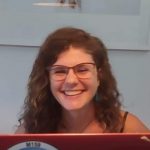
Julia Galetti
I am a Brazilian oceanographer (FURG) with a master’s degree in oceanography (LMI TAPIOCA – UFPE). My research focuses on the oxygen content of the Southwest Tropical Atlantic and the possible oceanic processes that may influence its variability. I also have a special interest in operational oceanography, which I have been working on since my graduation. I enjoy working from maintenance and operation of oceanographic equipment to data processing and analysis. In my spare time I like being outdoors, close to the sea, cycling and swimming.
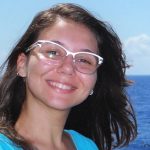
Julianna de Lemos Santana
I am graduated in Biological Sciences (Federal University of Alagoas – UFAL, Brazil) and a Ph.D. candidate in Oceanography (Federal University of Pernambuco – UFPE, Brazil). At the beginning of my scientific journey, I worked with the trophic and population ecology of Brachyura crustaceans. During my master’s research, I studied the feeding habits of crabs in reef environments with different degrees and sources of anthropogenic impacts. During this work, I noticed that many individuals were ingesting microplastic and presented morphological damages. This motivated me to understand how anthropogenic impacts affected marine species, especially the traditionally overlooked crustaceans. In this context, I formulated my Ph.D. project, which evaluates contaminants in the sediment and their potential effects on crustaceans. I develop research in chemical oceanography (analysis of polycyclic aromatic hydrocarbons, polychlorinated biphenyls, organochlorine pesticides, and trace metals in sediments). I also study genotoxicity in marine organisms through the micronucleus test. By working on multidisciplinary studies, I am passionate about developing multidisciplinary approaches to understanding marine ecosystems at local and global levels. I am also very motivated to develop additional skills in this field of study. In my spare time, I run, listen to music and enjoy myself with friends.
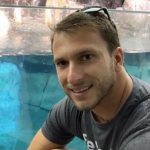
Juliano Coletto
I’m an oceanographer interested in fisheries science and on understanding energy flow in marine food webs. I started my academic journey as an observer at sea, collecting data aboard purse seiners capturing anchovy to be used as live bait in skipjack tuna fishing vessels. I did a great job while learning with fishermen about the ocean outside the University. Then I started my master’s project on operational oceanography, using remote sensing to study skipjack tuna habitat in the SW Atlantic. In my PhD, I collected samples in the industry and I learned stomach content and stable isotope analysis by studying skipjack tuna trophic ecology and migration. I’m currently working on WP3 on Triatlas Project, at the Institute of Oceanography, Federal University of Rio Grande – FURG. We are focused on trophic structures and understanding the role of mesopelagic fish in the food webs off southern Brazil.
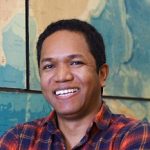
Juliano Ramanantsoa
I am a former postdoctoral researcher of the University of Cape Town, South Africa, where I also completed my PhD. I am currently Triatlas’ postdoc based at the Norwegian Research Center (NORCE). My background is in Oceanography, and mainly in applied geophysical fluid dynamics. My current work explores the large-scale ocean dynamic in South Atlantic and their potential interferences into ecosystems, specifically on tuna fisheries. I also have a recent fascination with pushing boundaries of my research to encompass aspects of fields such as social science, biology, and ocean governance. The connection between these fields and my own work is increasingly becoming significant due to the advent of climate change which calls for the need for transdisciplinary research. I plan to develop this interest a bit further during the summer school. In my spare time, I am a classic man doing what other people do normally, but I particularly like genuine human interactions, spending time having good conversations with good people – there is nothing worth more than that.
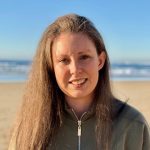
Kirstin Petzer
As a master’s student in Physical Oceanography and an All-Atlantic Ocean Youth Ambassador my goal is to connect with both citizens and scientists to engage on marine issues. I am currently in my second year as a master’s student at the University of Cape Town. My master’s research focuses on marine heatwaves, upwelling and the Southern Benguela Eastern Boundary Upwelling System. During my honours I looked at upwelling rates, also in the Benguela Upwelling System. I have a particular interest for coastal oceanography, primarily due to how integrated the health of the ocean and marine life is with the prosperity of local communities and those vulnerable in society. My goal for the future is to contribute to oceanographic knowledge and by extension increase the ability of sustainability and adaptability of coastal countries.
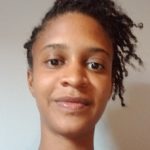
Latifa Pelage
I am a Postdoctoral Research at Universidade Federal Rural de Pernambuco (UFRPE). I have a degree in Earth Sciences from the university of Bordeaux. During my degree, I had the opportunity to spend a year in Spain in Salamanca, thanks to the Erasmus programme to study environmental sciences. I also have a master’s degree in oceanography from the University of Bordeaux. I did my PhD in Brazil. My thesis was about different anthropogenic impacts (small-scale fisheries, habitat degradation) affecting coastal (estuarine and marine) ecosystems in the Northeast of Brazil. I have experience in studying food webs using stable isotopes. I have also worked with satellite images that I analysed with GIS. I am interested in scientific issues directly linked to social problems and had the opportunity, through the outreach activities of the TAPIOCA project, to work with fishing communities. I am a curious person who likes to learn new things, meet new people, taste new food, and visit new places.

Léo Costa Aroucha
Graduated in Oceanography (2013-2018) at the Federal University of Pernambuco (UFPE), with 1-year (2015-2016) in the National Oceanography Center (NOC) at the University of Southampton (UK). Within this period, I was a fellow of the Brazilian Research Network on Global Climate Change – Rede CLIMA (2016-2017). Masters in Abiotic Oceanography (2019-2021) also at UFPE, with my research focus on the spatial-temporal variability of the North Brazil Current (NBC) rings and responses of CO2 fluxes to these NBC rings. I was also a collaborating researcher in the Laboratory of Physical, Coastal, and Estuarine Oceanography – LOFEC (2016-2021), investigating Northwestern Tropical Atlantic inter- and intra-annual variability, and at the Center for Renewable Energy – CER, working on seasonal wind forecast, both at UFPE. My research interests cover climate variability, ocean-atmosphere processes, and ocean dynamics, focusing on the Tropical Atlantic. Currently, I am a Ph.D. candidate in Physical Oceanography at GEOMAR (Helmholtz Centre for Ocean Research), in Kiel, Germany, as a scholarship holder of the Deutscher Akademischer Austauschdienst (DAAD – Germany). My study focus is on the influence of freshwater fluxes (FWF) on the sea surface temperature (SST) variability in the Southeastern Tropical Atlantic. We aim to understand how the FWF impact and contribute to increasing the SST in the Angola-Benguela area, and what is their effect on events such as the Benguela Niños.
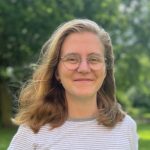
Mareike Körner
I am a doctoral researcher in the physical oceanography department of the GEOMAR Helmholtz Centre for Ocean Science Kiel, Germany since the beginning of 2020. My research centers around the tropical Angolan upwelling system. I investigate the physical mechanism that control the productivity season in coastal waters off Angola. One focus of my work is to understand the role of mixing in the Angolan ecosystem. I mostly work with observational data collected during research cruises in this area. Before starting my PhD, I got my bachelor’s degree in physics of the earth system at Kiel University. This course of study focuses on Meteorology, Oceanography, and Geophysics. Afterwards I finished my master’s degree in climate physics also at Kiel University. I like to spend my free time outside. I enjoy activities like sailing, hiking or biking.
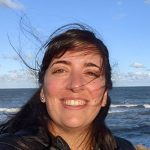
María Luz Torres
I’m a biologist. Currently, I am working as a postdoctoral researcher at National Institute for Fisheries Research and Development (INIDEP) and Marine and Coastal Research Institute (IIMyC) in Mar del Plata, Argentina. My research focuses on the temporal and spatial variability of fisheries resources in the Southwestern Atlantic Ocean and their link with the environment, which is reflected in the landings variability. I graduated from La Plata National University and I recently earned my PhD at Mar del Plata National University. My thesis was focused on evaluating the argentine squid (Illex argentinus) and the biological and physical oceanographic conditions along the shelf-break front in the Southwestern Atlantic (c.a. 38ºS-48ºS) where the fishery occurs. For the analysis, I worked with diverse time-series datasets from different sources such as research cruises (environmental and fisheries evaluation), fishing landings, and remote sensing products. During my postdoc project, I will further deepen the study of the squid abundances variability and other population aspects in connection with the physical and ecological properties, and the macro-scale environmental processes along the Argentine continental shelf ecosystem. In my free time, I enjoy doing outdoor activities like trekking, swimming or diving.
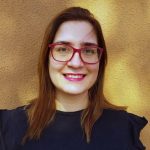
Marília Previero
I am a Postdoctoral Researcher at Universidade Federal Rural de Pernambuco (UFRPE), Laboratory of Marine Ecology (LEMAR). My research focuses on spatio-temporal analysis of tuna fishery in South Atlantic Ocean. I investigate the albacore distribution and migration and its relationship with the environmental variables. Previously I worked with spatial dynamics of demersal fisheries (Southeast of Brazil), indicators of stocks’ exploitation status, risk assessments, studies of age and growth and ethnoichthyology. My academic background is on small scale reef fisheries at Abrolhos Bank, East Brazil shelf, where I developed some field activities such as interviews with fishing communities and fish biological sampling at commercial landings. I am PhD in Oceanography (Universidade de São Paulo – USP). Master in Ecology (Universidade Estadual de Maringá – UEM). Graduate in Biological Sciences (UEM). I am interested in exchanging experiences and learning about fisheries spatial modeling, fishery predictions based on climate changes and climate predictions.
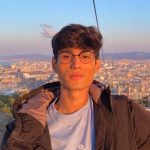
Matheus Batista
I am an Oceanographer graduated at Federal University of Pará (UFPA), where I developed my study related to CO2 fluxes in amazon estuaries. I am currently a Master’s student at the Graduate Program in Oceanology at the Federal University of Rio Grande (FURG). I am studying the Marine Biogeochemistry with emphasis on the Marine Carbonate System and sea-air CO2 fluxes. in Tropical Atlantic Ocean. This region is influenced by complex systems of surface currents and the strong input of freshwater from the Amazon River, in addition to atmospheric influence such as the Intertropical Convergence Zone, makes the region important in carbon biogeochemistry. The focus of my study is to investigate the influence of the Amazon River Plume on the spatial variability of carbonate system parameters in the Tropical Atlantic Ocean. I enjoy spending my free time with my friends and family, as well as traveling and hiking.
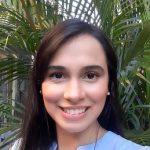
Morgana Brito Lolaia
I am a PhD student in Animal Biology at the Federal University of Pernambuco (UFPE), Brazil. I am currently investigating zooplankton’s ecology, functional diversity, and stable isotopes during a time series in the coastal waters of Tamandaré Bay (Brazil). My focus is to explain how seasonal and environmental descriptors from 2013 to 2019 influence the zooplankton variability and copepod functional diversity. I also investigate which species are significantly associated with the temporal variability of the stable isotopes composition of zooplankton within a novel species-biomass-isotopes-mixture (SBIM) approach, which is a relative biomass matrix to explain the stable isotopes signature of the zooplankton community. In my master’s degree, I studied the micro and mesozooplankton at the edges of coastal reefs of Tamandaré Bay, using two new passive net systems. I have a bachelor’s degree in Biological Sciences/ Environmental Sciences at UFPE, where I studied the meiofauna community associated with estuarine mudflat. I am a mother of two boys. They and my husband are the people I like to spend my free time with. During this time, I try to pass on the love of science to my children.
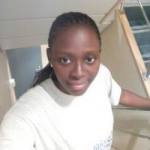
Ndague Diogoul
Ndague is a senegalese post-doc researcher, graduated from Cheikh Anta Diop University (UCAD). Currently, Ndague is working as a postdoc in the TRIATLAS project for IRD and is based at ISRA/CRODT in Senegal (both Triatlas partner). She wrote her PhD on the following topic:“Study of the pelagic structuring of the Canary Current Large Marine Ecosystem Canary Current Large Marine Ecosystem (CCLME) using an acoustic approach fisheries”. Ndague’s thesis was conducted in collaboration with the National Institute of Halieutic Research (INRH, Morocco) and the Marine Environmental Science Laboratory (LEMAR) at the Institute of Research for Development (IRD, Brest France). With her few years of experience, Ndague has since her master’s degree performed research that has resulted to the writing of 5 scientific reports, 5 scientific publications, 3 scientific edition of proceedings, more than 5 sea surveys and around 10 presentations at international conferences. Ndague has worked in the AWA EU FP7 Preface projects and has also been a member of the technical committee of ICAWA international conferences. In pursuing these interests, Ndague’s researches focuses on the acoustic study of mid-trophic levels of pelagic ecosystems in the southern part of the CCLME. In the future, she hopes to expand her knowledge in marine ecosystem modelling.
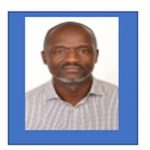
Paulo Coelho
Paulo Coelho is a marine biologist and physical oceanographer with a MSc degree in Marine and Coastal Zone Sciences. He is extremely interested in issues related to ocean circulation, OMZ, climate change and acidification, besides showing great interest in analysis and interpretation of oceanographic data (temperature, salinity, dissolved oxygen, and fluorescence). During my 16 years professional career, at the National Institute for Fisheries and Marine Research (INIPM) I have participated in several regional and international projects such as PREFACE, TRIATLAS, SACCUS, BANINO and VOICE. At INIPM, I am involved in the analysis of physical-chemical oceanographic data, collected from cruises (R/V Dr Fridtjof Nansen and Meteor) and fixed stations and I am responsible for preparing monthly, quarterly, and annual reports. As expectations, I have a great interest in learning to work with ocean current, wind, and nutrient data (analysis, interpretation, and mapping) in software like MATLAB, Octave and ODV.
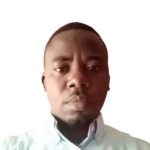
Roy Dorgeless Ngakala
I am a Congolese PhD student in physical oceanography at University of Abomey Calavi (UAC) in Benin. My research focuses on the dynamics and biogeochemical impacts of coastal upwelling north of the mouth of the Congo River, and the influence of the river on it, using a modeling approach. Currently, I try to determine the main mechanisms controlling the Congolese upwelling system. Before that, I got my master’s degree (double degree) in oceanography and applications in Benin/France. For my master thesis, I worked on automatic correction of Sea Surface Salinity measured on merchant ships, using the closest ARGO data.
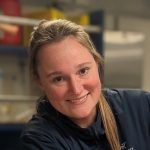
Sabrina Duncan
My name is Sabrina Duncan and I am currently a PhD student at the Thünen Institute for Sea Fisheries and the University of Bremen, in Germany. I am studying the assemblage structure and trophodynamics of mesopelagic fishes in the Benguela and Canary Currents. I currently work in the TRAFFIC project (Trophic transfer efficiency in the Benguela Current) with our partners in Germany, Namibia, and South Africa. In the northern and southern subsystems of the Benguela, we are examining the community composition of mesopelagic fishes and the environmental factors that drive these communities. Secondly, we are interested in the role that mesopelagic fishes play in the pelagic food web. Before I began my PhD, I completed my MSc in ecology, evolution, and systematics and examined the effect of zooplankton communities on lake whitefish body condition in pre-alpine lakes, at the University of Munich. Prior to my MSc, I worked in the field of environmental education, teaching tropical ecology and conservation field courses in Costa Rica and the United States. My favourite activities include hiking, crafting, and really any outdoor activity with friends.
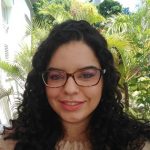
Sayonara Lins
Graduated in Oceanography at the Federal University of Pernambuco (2015), with a 6-month exchange period at San Diego State University (SDSU) in 2014 through the CAPES Fipse program, and a master’s degree in Oceanography from the same university. I’m currently a Ph.D. student in Abiotic Oceanography, with emphasis on Physical Oceanography of Estuaries and a Research member of the Laboratory of Estuarine and Coastal Physical Oceanography (LOFEC). During my undergraduation and furthermore in the postgraduation I’ve worked with the geological and physical oceanography laboratory, participating in projects focusing on sedimentary and geochemical aspects of beaches and estuarine dynamics in mangrove environments, respectively. My Ph.D. is focused in the circulation and mixing processes in the Ipojuca river estuary. I’ve been interested in coastal environments by the direct interaction with the surrounding populations, the pressures arising from their multiple uses and their importance and ecological function.
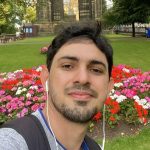
Thiago Monteiro
I am an oceanographer (Federal University of Pará, Brazil), with a master’s degree in oceanography and now as a PhD student at the Federal University of Rio Grande (Brazil). Since my master’s degree I have been studying the marine carbonate system and CO2 fluxes in Antarctica. The main objective of my thesis is to investigate how the mixing of water masses with distinct biogeochemical characteristics influences the storage of anthropogenic carbon in the North Antarctic Peninsula. In addition, I have participated in studies on the carbonate system in the tropical and south Atlantic Ocean and in estuarine environments. I am very excited about interdisciplinary studies, so I am very interested in building collaborations that can allow us to study marine environments in different ways. I am very excited to talk about science, I love being on board and in my spare time I like to travel, listen to music, and watch movies and documentaries.
